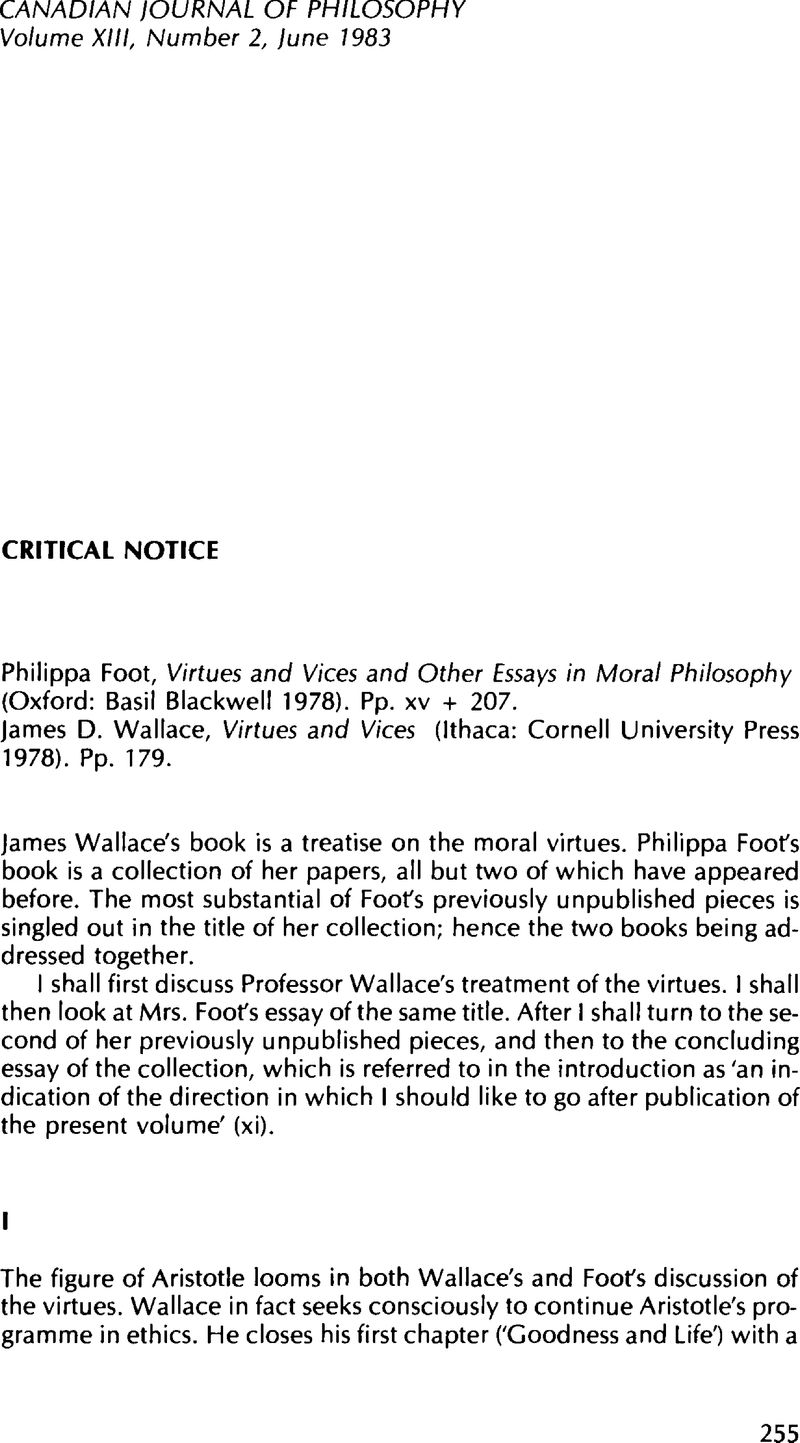No CrossRef data available.
Article contents
Philippa Foot Virtues and Vices and Other Essays in Moral Philosophy (Oxford: Basil Blackwell 1978). Pp. xv + 207. - James D. Wallace Virtues and Vices (Ithaca: Cornell University Press 1978). Pp. 179.
Review products
Published online by Cambridge University Press: 01 January 2020
Abstract

- Type
- Critical Notice
- Information
- Copyright
- Copyright © The Authors 1983
References
1 Throughout numerals in brackets give the page number of the passage or expressions quoted.
2 Without denying the differences that exist, I have emphasized certain similarities between human communities, human ways of life. The same kind of living organisms comprise these communities … .’ (159)
3 Cf. a wasp nest, or a bee hive.
4 The original remark was made of socialism. (Quoted from Bruce Dancis, 'Socialism and Women in the United States 1900-1916,’ Socialist Revolution, No. 27 (1976) 132, by Christopher Lasch, The Culture of Narcissism [New York: Warner Books 1979], 348.)
5 The difficulty here has been identified by Holland, Roy in ‘Is Goodness A Mystery?', The Human World, No.9 (1972)Google Scholar and The University of Leeds Review, 13 (1970), reprinted in Against Empiricism (Oxford: Basil Blackwell 1979). Holland's essay is directed in part against Peter Winch's thoughtful attempt in 'Nature and Convention’ (1960) to establish that truth telling has necessarily to be a virtue in every society. I believe Wallace's book would have benefited greatly from consideration of these two essays (neither of which is referred to or noted in the bibliography) and also from Winch's essay ‘Human Nature', to be found with the 1960 essay in his volume Ethics and Action (London: Routledge and Kegan Paul 1972).
6 Compare Wallace: ‘If an individual lacks certain of [the] virtues, then that person is incapacitated in crucial ways. Other virtues, however, are such that although one who lacks them is not necessarily handicapped, you and I could not live well if most other people lacked these virtues’ (10-11).
7 Compare Wallace: ‘Virtues are not masteries of techniques’ (56).
8 Compare Wallace: ‘Some virtues involve being able to do difficult things, but the difficulties involved are due to contrary inclinations, not to technical difficulties in the actions themselves’ (46).
9 ‘In Search of the Moral Must,’ Philosophical Quarterly, 27 (1977)
10 We have … on the one side the moral consideration about the hurt the other man will suffer, and on the other the non-moral consideration about the financial loss’ (184)
11 Hacker, P.M.S. and Raz, J. eds., Law, Morality, and Society: Essays in Honour of H.L.A. Hart (Oxford: Clarendon Press 1977)Google Scholar
12 The closest she comes to doing so is at 198: ‘On the … view … for which I am arguing, the attitudes of approval and disapproval would not be what they are without the existence of tacit agreement on the question of who listens to whom and about what.'
13 I say ‘may': I frankly do not find several of the grounds Foot instances in her example - ‘because the man is too old for her … because they think the marriage will not work out well … because the family's honour … is at stake’ - to be obviously non-moral grounds. (Where there are very good reasons for Judging that marriage will not work out, this could not only be a moral ground for objecting, but could render morally culpable, because irresponsible, whoever cooperated in bringing the marriage about.) I also confess that some other of Foot's alleged 'grounds on which a parent can disapprove [my emphasis) and a stranger cannot’ (e.g. ‘not rich enough', ‘not well enough connected’), puzzle me as much. Doubtless a parent logically can disapprove on such grounds. But reasonably?
14 Beehler, Rodger Moral Life (Oxford: Basil Blackwell 1978),Google Scholar chapter VIII, and chapters I, Ill, and the introduction
15 ‘It seems that approving and disapproving are special cases of being for and against’ (200). ‘[T]he position of being against something is one that only society can create’ (202).
16 In his critical notice of Moral Life in Volume XI of this Journal, Richard Norman Judges that I have ‘lost sight of … the importance of “agreement'''; of how 'primitive responses such as colour perceptions, or feelings of caring, may not be social in the sense of depending on social rules and conventions, but … are social in the sense of being shared'; and that ‘(t]his is crucial’ (162). Yet turning to pages 31-2 of the book I read: ‘It is agreement in that form of life I have called “caring” which makes possible, and gives sense to, “moral practices”. Just as in the case of colour discrimination there is a public criterion of “red” which we can appeal to by virtue of the fact that we agree in what we see, so too in the case of moral discrimination there is a moral concept (and specific criteria) of “decency” to which we can appeal by virtue of the fact (and to the extent) that we agree in caring about one another. The agreement here is not agreement in practice but agreement in attitude … Failure of an individual to share in this “form of life” will have as its consequence the non-intelligibility of the moral.'




